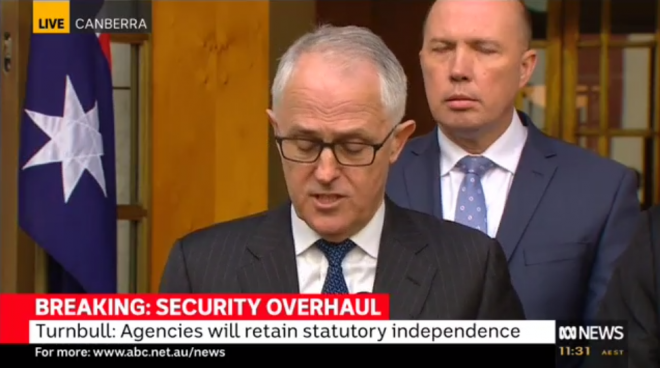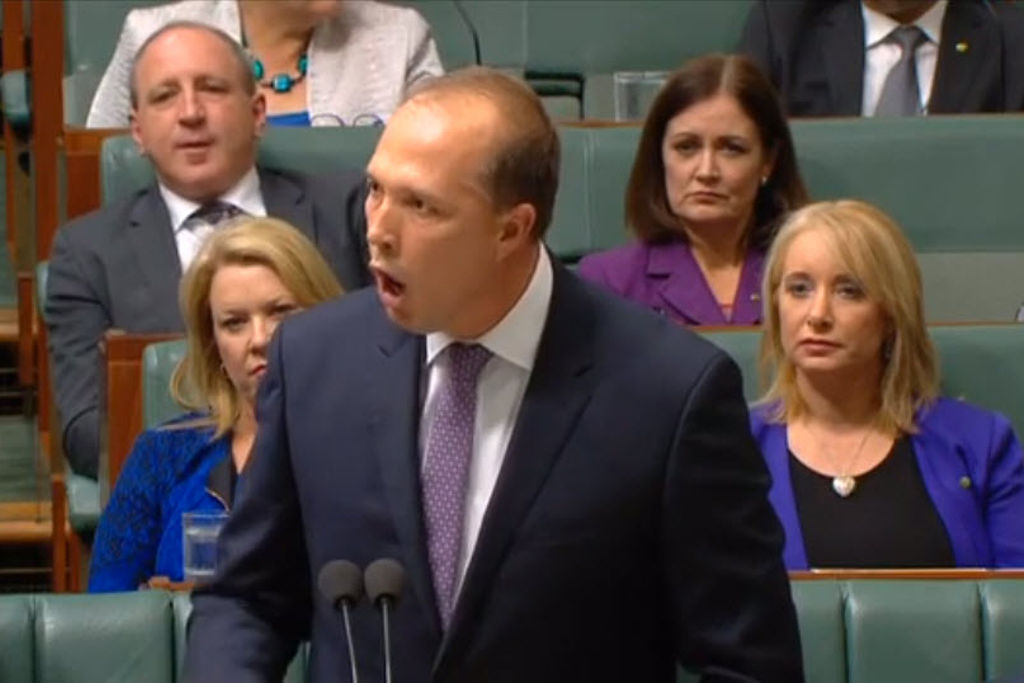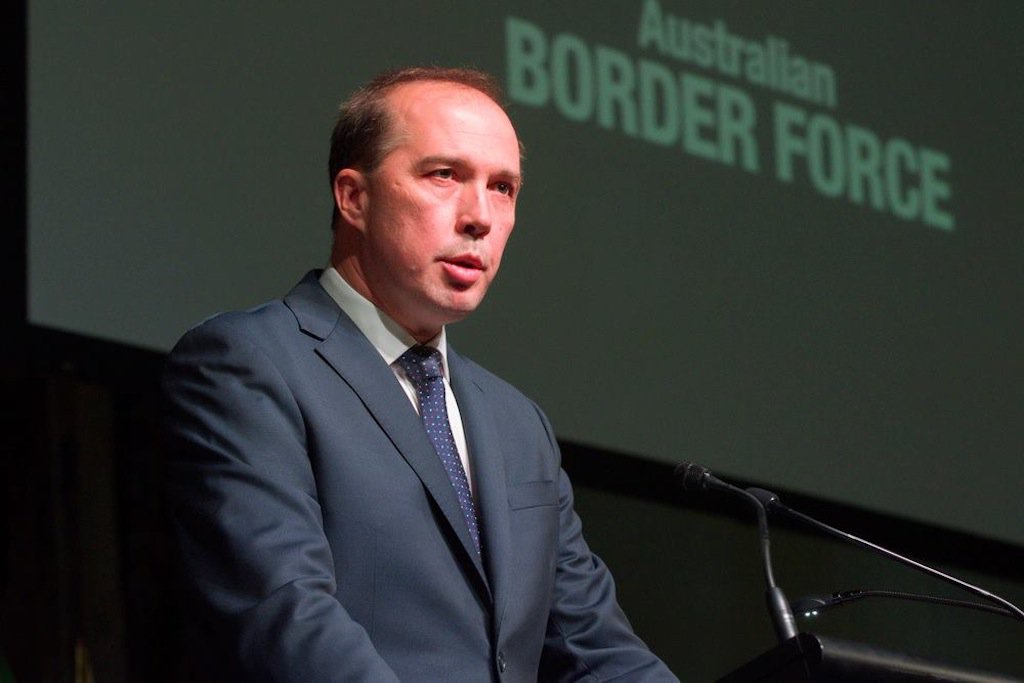Why Has Malcolm Turnbull Made Peter Dutton The Most Powerful Minister In Australia?
Australia's controversial immigration minister just got a huge promotion.

This week Malcolm Turnbull announced the creation of a new “super-ministry” that combines responsibility for immigration, border protection and national security into one mega-department.
Peter Dutton will be in charge of the new ministry, dubbed “Home Affairs” and closely modelled on the UK’s Home Office. Yep that’s right, everyone’s favourite Mr Potato Head immigration minister is now responsible for pretty much everything to do with national security in Australia, including the Australian Federal Police and ASIO.
Speculation had been building for months that Turnbull would find a way to promote Dutton, who is considered to be the Liberal’s great white hope by the party’s right-wing (I know, I know — it’s hard to believe, but it’s true). But not everyone in the Coalition is happy with the radical shake-up and security experts are doubtful that it will have much of an impact.
So what’s really going on and why has Turnbull decided to make Dutton so powerful?
Where Did The Super-Ministry Idea Come From?
On Tuesday Turnbull released a review into Australia’s intelligence agencies that recommended some changes to the way different agencies work together. In the same press conference the Prime Minister also announced the creation of the new Home Affairs ministry and confirmed Dutton would be the boss. There was just one small problem: the idea for the new super-ministry… wasn’t recommended by the intelligence review. So where did it come from?
The idea of Home Affairs portfolio was actually first suggested by former Labor leader Kim Beazley back in 2001. It went on to become part of Labor’s election policy in the 2004 and 2007 elections, but when the party won government it didn’t implement any of the proposals.
In 2014 there were rumours that Tony Abbott was planning on creating a new super-ministry focused on national security and that Scott Morrison was going to be put in charge. At the time both the foreign minister, Julie Bishop, and the attorney-general, George Brandis, were sceptical about the need for it.
The idea disappeared for a couple of years but speculation kicked off again this March, when Sky News reported Turnbull was seriously considering a new ministry, but this time Dutton would be the boss.

Tfw the super-ministry power kicks in.
According to Sky News, both ASIO and the Australian Federal Police were opposed to the idea. The government was also reportedly split, with one Liberal labelling Dutton as a “fascist”.
But despite the apparent lack of support for the overhaul, the Prime Minister went ahead anyway.
Turnbull Used To Hate The Idea
On The Project last night Turnbull explained the new ministry was “all about Australian security”, which is great but doesn’t really explain much. During the interview he said that he had always supported the idea of a giant home affairs. But that isn’t quite right.
Back in 2008, when Turnbull was the leader of the Opposition, he defended the Howard government’s arrangement that saw each security agency operate independently.
“Labor’s answer was to bring it all into one gigantic superbureaucracy, and today the Prime Minister [Kevin Rudd] himself has exposed that proposition as the hoax it always was,” Turnbull said.
He went on to describe a potential merger as a “wasteful and costly exercise in bureaucracy” and said it would end up “confusing and complicating the existing practice of reporting lines within and between those agencies.”
Nine years later, he decided to create the “gigantic superbureaucracy”.
What Do People Think Of The Changes?
So far the government hasn’t gone a great job of explaining the changes, which has created the perception that it’s all about giving Dutton a fancy-sounding new job.
National security experts are sceptical of the new department and have suggested it’s all about politics, not policy.
Michael Wesley, a professor of international affairs at the Australian National University, said that “‘We have a system that works extremely well and playing politics with Australians’ lives and safety, potentially, is an extremely bad move in my view.”
John Blaxland, the head of the ANU’s Defence and Strategic Studies Centre, tweeted that the government might not have thought through the “significant ramifications” of the changes.
Important announcement here with significant ramifications. Not sure they've all been thought through though. Contestability, collegiality? https://t.co/c4JXiBa48k
— John Blaxland (@JohnBlaxland1) July 18, 2017
Turnbull has used the UK’s Home Office to justify why the new department is needed in Australia. But some British experts have suggested the Home Office isn’t all it’s cracked up to be.
Julian McCrae, a former advisor to Prime Ministers Tony Blair and Gordon Brown, told the ABC that “Certainly the UK’s history on merging organisations makes you sceptical about the claimed benefits.”
Colonel Richard Kemp, the former commander of British forces in Afghanistan, said the Home Office was “one of the most controversial government departments”. While Kemp acknowledged there was “operational sense” in having security agencies working more closely together, he said that the Home Office was occasionally accused of being “unwieldy”.
At this stage we’re pretty light on details in terms of how day-to-day operations will change, but given how much internal opposition there’s been to the super-ministry, and how divided the government is generally, it’s pretty fair to approach the whole thing with a big dose of scepticism.
So Why Did Turnbull Do It?
Politics.
Another security expert, Greg Barton, explained this week that “No one who works in this area apart from Peter Dutton and some other ministers who, for political faction reasons are keen on the idea, have come forward with a reason [for creating the super-ministry].”
The idea seems to have much more to do with internal Liberal Party politics than anything else. Dutton is currently the most high-profile member of the Liberal Party’s conservative faction, after the ongoing slow-motion disintegration of Tony Abbott and the disappearance of Scott Morrison (Seriously, where is he? You never see him these days).
The right-wing of the Liberal Party hasn’t been shy in wielding their influence since Turnbull took power. You just need to look at the paralysis over marriage equality for an example of how they’re holding the government hostage.
Turnbull’s ongoing leadership rests on keeping the right-wing happy. If he doesn’t appease them he faces a potential challenge, probably from Peter Dutton. So if Dutton wants a big, shiny new department to play around with, he gets it, regardless of how bad an idea it is.
The whole thing is just another depressing reminder that the future of Australia is currently entirely in the hands of a band of right-wing dropkicks in the Liberal Party, who seem to be obsessed with blocking gay marriage and whipping up hysteria over immigration — which is ultimately what it feels like this super-ministry is all about.
–
Osman Faruqi is Junkee’s News and Politics Editor. You can follow him on Twitter at @oz_f.



